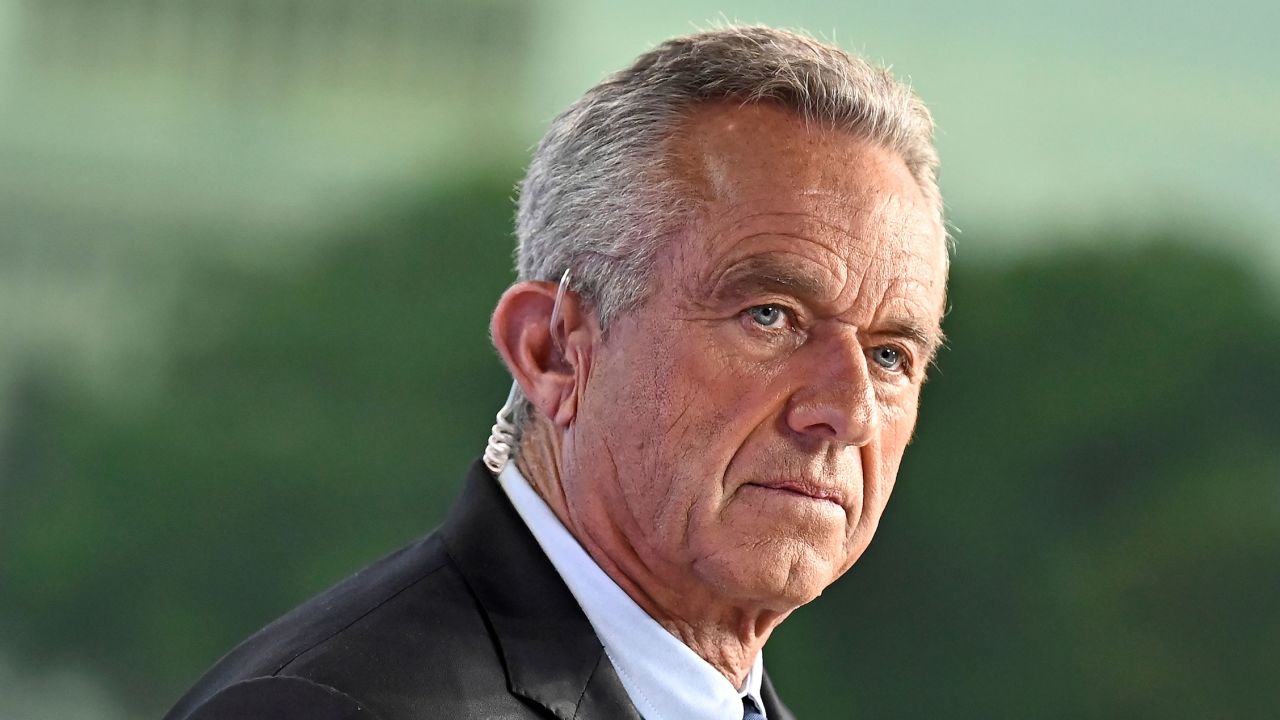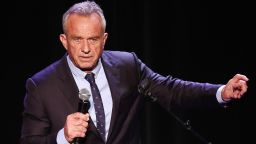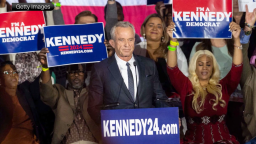Editor’s Note: Peter Bergen is CNN’s national security analyst, a vice president at New America, a professor of practice at Arizona State University, and the host of the Audible podcast “In the Room With Peter Bergen,” also on?Apple?and?Spotify. The opinions expressed in this commentary are his own. Read?more opinion?at CNN.
On Monday, Robert F. Kennedy Jr. said he was running as a third-party candidate to be president of the United States. Kennedy holds?a mix of Republican and Democratic policy views which could make him attractive to the large numbers of American voters who are unhappy about a Biden-Trump rematch.

This may pose some real dangers for both President Joe Biden and former President Donald Trump, who are the frontrunners in their respective parties, since in closely-contested US presidential elections, a small percentage of voters in relatively few swing states can have a disproportionately large effect on the outcome.
Third-party candidates — like the Green Party’s Ralph Nader in the 2000 election between Al Gore and George W. Bush, and Jill Stein in the 2016 election between Hillary Clinton and Trump — have had an outsize effect on the outcome of close US presidential elections?despite their relatively small numbers at the polls.
It’s quite possible that Kennedy could?do more damage to Biden as a third-party candidate than by running against Biden in the Democratic primaries, where Biden has a large lead over Kennedy.?In a?CNN New Hampshire poll?last month, Biden had the support of 78% of likely Democratic primary voters in this early primary state, with only 9% for Kennedy.
By contrast, running as an independent candidate, about one in seven American voters would vote for Kennedy, according to an Ipsos/Rutters poll released on Thursday. That number could put a serious dent into Biden’s support in a general election?—??as well as Trump’s, since Kennedy draws support from both sides of the aisle.
So it is worth considering what — beyond his storied family political name and the dissatisfaction that many voters have with both Biden and Trump — the appeal of Kennedy might be.
RFK Jr.’s predilection for fringe positions is well known, particularly his long-debunked view that vaccines cause autism. But what makes him an attractive candidate for some Americans is that he is not easily pigeonholed as either a typical Democrat or a conventional Republican, since his policy positions straddle the left and the right.
His blistering critiques of the Biden administration on everything from how it has handled the Covid-19 pandemic to its support of the war in Ukraine have earned him praise from Republicans.
At the same time, he describes himself as “a traditional Kennedy Democrat. I’m a leading environmentalist, arguably, in the country. I’m for medical autonomy, for women’s right to choose. I’m anti-war. I’m pro-free speech.”
Kennedy told me this at the end of August for the Audible podcast “In the Room with Peter Bergen.” Beyond querying him about his controversial views on the pandemic — in which he debated with me about whether Covid vaccines had actually saved many lives —?I was also interested in exploring his positions on the kinds of issues many American voters care most about, such as the economy, the border, affirmative action, gun control, climate change, abortion and the war in Ukraine.
Helping Trump?
I asked Kennedy if he was worried that running against the president would only serve to hurt Biden’s chances of beating Trump, the leading Republican nominee, in what will likely be yet another close general election.
He replied, “First of all, I get as many votes from Republicans as I do from Democrats. So, I don’t think that there’s that problem.” Kennedy went on to say, “President Biden?has wounded himself. You know, he’s telling the country that he’s brought prosperity in the country. And?57% of people in this country cannot put their hands on $1,000 if they have an emergency.?For those people, the engine light comes on in their car, and it’s the end of the world.”
Asked how he would fix this situation, Kennedy explained, “I will wind down the empire abroad, and I’ll start bringing that money home and investing in schools, public health, eliminating the chronic disease epidemic, and getting Americans healthy again. Our biggest cost, even bigger than the military, is health care.”
I asked if he thought a second Biden term or a second Trump term would be worse, and he surprised me by saying, “I don’t think either of them are good, but you know, I’m worried about Biden because I think he will — is more likely to get us in a nuclear war.”
Kennedy also seems to firmly believe that the war in Ukraine is as much the Biden administration’s fault as Russian President Vladimir Putin’s. And he believes that, if the Russian leader’s back were up against a wall, Putin wouldn’t hesitate to use atomic weapons, telling me,?“He’s already said that if it’s existential, he’s going to use a nuclear weapon.”
Kennedy’s big idea in foreign policy is “neo-isolationism,” i.e., pulling back from?what some term?“American Empire.” His position is one that is embraced?by many on the left flank of the Democratic Party as well as many Republicans, a large majority of whom think the US should stop funding the Ukraine war. A CNN poll published in August found 71% of Republicans think the US should not authorize additional funding to support Ukraine.
The Supreme Court
In light of the Supreme Court’s decision last year that overturned?Roe v. Wade?and the constitutional right to an abortion, I asked Kennedy how the Catholic faith he had grown up with might have informed his views about abortion. He told me, “I’ve seen late-term abortion pictures and they’re horrifying. So, I understand the people who want them banned, but I also am too skeptical of government to believe that it should be the one that should be dictating bodily decisions.”
Kennedy is also opposed to the Supreme Court’s decision in June to end affirmative action for minority Americans going to college, a case in which Harvard, his alma mater, was one of the defendants. At the same time, he says “legacy admissions,” which give the children of alumni preferential treatment when applying to attend many elite colleges, should end. He described the practice as “affirmative action for White people only.”
Even though the Supreme Court has produced two key recent decisions that he disagreed with, Kennedy would not — as some Democrats have advocated — add more liberal judges to the Supreme Court, saying, “I just think it’s a terrible precedent. I’m very much aware of the attempts by FDR to do that and how that was viewed by the American public as cheating on the rules.”
Climate change
Much of Kennedy’s professional career was spent as an environmental lawyer, most notably helping to clean up the Hudson River in New York. Since this year is on track to be the hottest on record, I asked him what the US should do about this.
He said he opposed “carbon capture,” a technique in which carbon is pumped under the ground in deep wells to be stored there. He describes this as a “boondoggle” for the carbon-producing industries.?Instead, he advocates for “habitat” and “environmental” protection since “destroying the natural systems destroys the resilience of the planet to climate changes.”
The border
I also asked Kennedy how he’d approach another important issue for voters: America’s southern border.
Much of Kennedy’s take on border security sounds more in line with Republicans than Democrats. He said Trump had gotten “the wall” mostly right but that “you don’t need a wall all the way 2,200 miles from Brownsville, Texas to San Diego. But you do need a physical barrier. You do need a wall in the heavily populated areas.”?Kennedy also said many more asylum judges are needed to process the hundreds of thousands of asylum claimants who are now crossing the US-Mexico border.
The Second Amendment
Kennedy says he is not a gun owner himself, but he is not for “taking people’s guns away,” and he would include in that category semi-automatic weapons like AR-15s that have often been used in mass shootings in the US. He said, however, if he were to become president and the US Senate and the House both had passed measures banning AR-15s, he would go along with that decision.
Get Our Free Weekly Newsletter
- Sign up for CNN Opinion’s newsletter
- Join us on Twitter and Facebook
But in discussing America’s “gun culture” and the view by some that “their AR-15s are protecting them from government overreach” — he said it was a position he felt some sympathy with, given what he considered to be the massive US government overreach during the Covid pandemic.?
On the Ukraine war, pandemic measures, US border policies, and the Second Amendment, RFK Jr. could easily be mistaken for a Republican, while on abortion, affirmative action and climate change, he sounds very much like a Democrat.?All of this makes Kennedy a wild card who may scramble the presidential election and damage both Biden and Trump in unexpected ways.



